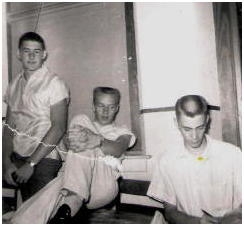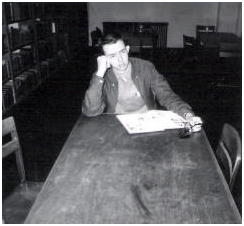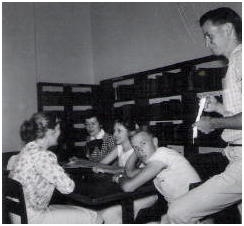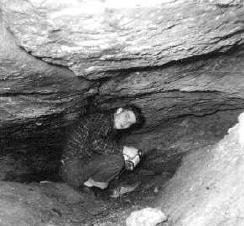ROCKET BOYS OF CALHOUN COUNTY - Crashing Through Misty Clouds, Discovering The Universe

Three of the Calhoun Rocket Boys died from cancer (L-R) Vearl Haynes (died 2009), US Forest Service career; Dr. William Barnes (died 1998), surgeon and Dr. Lewis "Buck" Ferrell (died 1997), Doctor of Divinity
NASA's landed the Curiosity on planet Mars. It didn't get much attention, but sent back photos of the faraway accomplishment.
Since then a number of amateur photographers have taken remarkable pictures of the universe from Calhoun Park, some breathtaking, with the dark skies of Calhoun becoming a commodity for the development of an astronomy park.
Such events bring a flashback to the ROCKET BOYS OF CALHOUN COUNTY:
By Bob Weaver/Originally Published 1999
Lying flat and gazing at the stars from the pastures and meadows around the Joker Ridge in the 1950s was a summer pastime of the country boys around Hur, opening the universal wonderment that nagged at their devils of dubious excitement.
To fly faster than any bird or plane and crash though the misty clouds above us, go to the planets and distant galaxies and discover the nature of the universe.
We decided to build a rocket.
Four years before Russia shocked the world with its Sputnik in 1957, the rocket builders of Calhoun County began to plan and design.
Lacking financial backing, the early years were spent launching 13-foot army surplus balloons filled with natural gas with sundry items tied on a string, not the least being aluminum pie pans doused with oil and set on fire to tease the neighbors into believing in UFOs.
One such balloon with burning plate was launched over Grantsville, stirring up the citizens.
We also blew up a lot of things.
The real thing got under way after ordering items from Popular Science and Edmund Scientific, but first to use that which was available, 12-gage shotgun shells fashioned into miniature rockets, with a straight pin inserted into the gunpowder chamber and hooked to an electric train transformer for an igniter.
Kaboom!
It was dangerous, but it went into the air.
Studying books on rocket science, we built the aluminum shell of a lightweight rocket with a pointed nose, fins, decals and all. It stood three feet tall, impressive to us.
Joined by Lewis Lamar Ferrell, we began to produce a "radio" program about flying to the moon, enlisting the acting services of other Calhoun High eight graders and recording the production on the only tape recorder in Calhoun County High School, with sound effects, music and poor drama skills.
It was a pathetic version of "2001".
The production was played over the school's new PA system with the announcement we were going to launch a real rocket on the football field.
The ranks of the rocket boys expanded quickly.
It was the pressure of this commitment, despite a lack of money, that kept the scientific endeavor alive, but not without fanfare.
The eventful day arrived and we didn't have an engine to launch the shiny beautiful rocket.
Reverting to our earlier experimentation with shotgun technology, we inserted ten shotgun shells into the empty rocket chamber, inserted straight pins into their powder pockets and carefully wired them together.
There was no supervision.
Stretching about 75 feet of wire to the faithful train transformer igniter, we were ready for a blast off before the entire student body of Calhoun County High School, dismissed to the football field to watch the grand event.
Over the cheers of students and a drum roll provided by Billy Dean Roberts, the countdown began on the football field's PA system. Ten...nine...two...one...zero! Kaboom!
There was no consideration regarding the danger of the shotgun shell rocket toppling, or what kind of problems it could have caused.
The impressive rocket swiftly went into the sky above Grantsville, plum out of sight, bearing slightly toward Town Hill, never to found in our lifetime.
The kids cheered and the teachers praised and we felt proud on that glorious day in 1954, albeit a partial hoax.
We could have done the real thing, if only we had the money.
It would only be a matter of time when we got it all together and flew to the stars anyway.
It was a time for believing.
Russia shocked the world in 1957 by launching a satellite which circled the world, emitting a beeping radio signal. It was an event that spurred the space race, the creation of NASA with President John F. Kennedy's leadership.
The race to the moon was on.
For the 1957 Calhoun High homecoming parade, the Rocket Boys constructed our version of the Russian Sputnik, a round aluminum covered beach ball with antenna protruding mounted on a car top, a tape recorder emitting beeping sounds that echoed off the buildings in Grantsville.
The Calhoun Rocket Boys were a bumbling crew compared to the rocket boys of southern West Virginia, made famous by books and movies, but we gave it a try.
William Everett Barnes went on to become a leading West Virginia surgeon, airplane pilot and sports car enthusiast, to die of cancer at an early age.
Lewis "Buck" Ferrell obtained a Doctorate in Divinity, a devout Christian and long-time clergyman, to die of cancer at an early age.

Editor Bob Weaver, known in school
as "RJ," contemplating the universe
I engaged in radio broadcasting, reporting, and was a mortician, to later recover from alcoholism in 1979 and help start and administer treatment centers for alcoholics and the drug addicted, to return to my native ground, to become a county commissioner and start the Hur Herald.
If Bill, Buck, and myself had all lived in the same town during some of those years, Bill could have treated folks until they died, Buck could have preached their funeral and I could have buried them.
Vearl Haynes, who fulfilled his life-long ambition to work for the US Forest Service, also died of cancer in 2009.

(L-R) Jean Starcher, Betty Yoak, and Shelia Wilmoth,
hanging out with Rocket Boys Bill Barnes and Jack Barnes

Ronzil Lynch, when not looking at
the sky, crawled into Calhoun caves
Ronzil Lynch, Jack Barnes and a few others were among my Rocket Boy friends who looked at the stars and planets and dreamed of excursions with visions of far away worlds, searching for the answer of life's great mysteries and the meaning of God.
A few years later, my cousin Jim Weaver (1951-2008) came along with boundless curiosity, a rocketman, a curiosity he imparted to the thousands of students that crossed his path. He has also passed on.
I still look at the universal sky at night near the same spots where the Rocket Boys hung out 70 years ago, sometimes with a telescope.
My amazement has never left.
Since that time, Calhoun Park is among a few places in the US to view the stars, being a dark skies destination, unaware that it has always had a special connection to the universe.
Looking upward for answers, it might be worthy to reflect on what Cassius said in a Shakespeare play: "The fault, dear Brutus, is not in our stars, but in ourselves, that we are underlings."